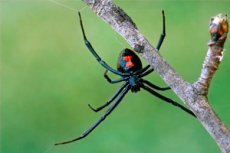Scientists create human antibodies that can neutralize black widow toxin
Sist anmeldt: 14.06.2024

Alt iLive-innhold blir gjennomgått med medisin eller faktisk kontrollert for å sikre så mye faktuell nøyaktighet som mulig.
Vi har strenge retningslinjer for innkjøp og kun kobling til anerkjente medieområder, akademiske forskningsinstitusjoner og, når det er mulig, medisinsk peer-evaluerte studier. Merk at tallene i parenteser ([1], [2], etc.) er klikkbare koblinger til disse studiene.
Hvis du føler at noe av innholdet vårt er unøyaktig, utdatert eller ellers tvilsomt, velg det og trykk Ctrl + Enter.

There are different species of widow spiders, including black, red and brown varieties in the Americas, the Australian redback spider, and several species of button spiders found in South Africa. In Europe, the black widow Latrodectus tredecimguttatus lives in the Mediterranean region, but recently, due to climate change, these spiders have begun to expand their habitats.
Widow spider bites can cause latrodectism, a disease in which the spider's venom, a neurotoxin called alpha-latrotoxin, attacks the nervous system and causes symptoms such as severe pain, hypertension, headache and nausea. Black widow bites can be treated with antibodies derived from horses, but to make the treatment safer for patients, researchers in Germany decided to develop fully human antibodies.
"For the first time, we present human antibodies that show neutralization of black widow venom in a cell test," said Professor Michael Hoost, a biologist at the Technical University of Braunschweig and senior author of the study published in the journal Frontiers in Immunology. "This is the first step toward replacing horse serum, which is still used to treat severe symptoms following a black widow bite."
Catching squirrels
Many patients bitten by black widows are not treated at all because the antivenom is made from proteins derived from horses, which are foreign to the human body and can cause unwanted side effects. These include serum sickness, a reaction to proteins in antiserum obtained from non-human sources, and a severe allergic reaction. The available antidote is also an undefined mixture of antibodies that varies from batch to batch. Despite these shortcomings, this antidote is the most effective treatment option at the moment.
"We sought to replace horse serum with recombinant human antibodies to provide a better product for patients and avoid the use of horses to produce the serum," Hoost said. To do this, scientists used an in vitro method called phage antibody display.
"This approach uses an extremely diverse gene collection of more than 10 billion different antibodies. From this large variety of antibodies, phage display can harvest antibodies that can bind to the desired target, in this case a toxin," Hust explained. p>
Antibodies created in this way can be reproduced with the same quality over and over again because the DNA sequence of the human antibody is known. They can also improve animal welfare because horses do not need to be immunized and bled to produce anti-black widow toxins.
Antibody optimization
Hust's team developed candidate antibodies that could be used to develop therapeutic antibodies. A total of 45 of the 75 antibodies generated showed neutralization of alpha-latrotoxin in vitro. One antibody, called MRU44-4-A1, showed exceptionally high neutralization.
What surprised the researchers was that only two of the antibodies were effective against the venom of other widow species. "To develop potential treatments for all latrotoxins, not just the European black widow toxin, we will need further improved cross-reactive antibodies," stressed Hust. The researchers also noted that further preclinical steps are needed to evaluate the effectiveness of the antibodies before entering clinical trials.
"In another project, we showed that we could develop human antibodies to treat diphtheria that are effective in in vivo studies. We intend to take the same steps for antibodies against black widow venom. This is especially important because with the spiders invading new habitats, the incidence of latrodectism and the need for therapeutic alternatives may increase in the coming years," Hoost concluded.
